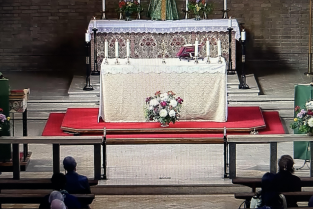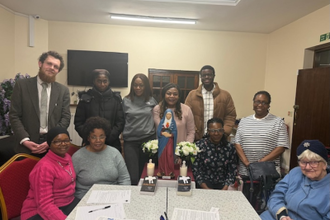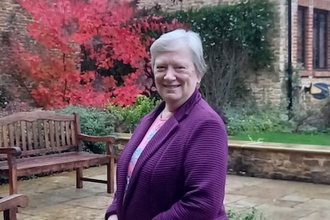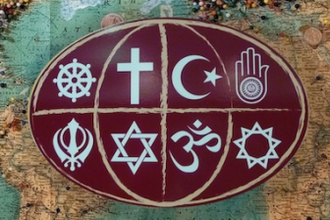Tina Beattie reflects on Irish Abortion Referendum
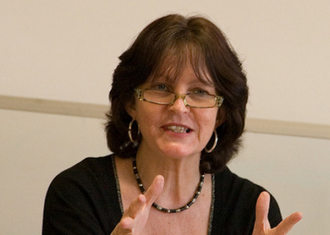
Dr Tina Beattie, Professor of Catholic Studies at the University of Roehampton in London and Director of the Digby Stuart Research Centre for Religion, Society and Human Flourishing writes: Many people today - particularly Catholics - might feel a profound sense of distress and pessimism about the likelihood of an overwhelming majority for the "yes" vote to liberalising abortion laws in Ireland. I want to share why I feel sad but deeply thankful for the result.
With some exceptions, the debate has been conducted with a high level of integrity and dignity on both sides. For the first time ever, women on both sides have been telling their stories, and the campaign was mainly led by women on both sides - though the "no" side had strong albeit tacit support from the Church. It's also important to acknowledge that this landmark moment is challenging because Ireland has one of the lowest maternal mortality rates in the world, despite having had very strict anti-abortion laws. This is a complex and challenging scenario that should disturb and unsettle us whatever we might have voted if we had taken part in the referendum.
But Irish women and girls have always had abortions, and they tell harrowing tales of what that means when it involves flying to Britain and enduring that trauma in a lonely and frightening world of strangers and bleak hotel rooms - if they can afford the "luxury" of a hotel room as well as an air fare. Otherwise, they fly back bleeding and in pain the same day. Now, they will no longer face that double ordeal. Why would anybody think this is preferable to respecting their decision or their need to end a pregnancy?
The "yes" vote is not a cause for celebration. It is a "yes" to respecting the freedom of conscience and moral autonomy of women in situations that no woman or girl should ever find herself in, whatever the conditions of her conceiving and whatever the reasons for her not wanting to carry the child to term. I only hope that now, those who use the language of killing and murder will pause for thought, and I say this particularly with regard to my co-Catholics. How might Catholics accommodate this decision within their moral understanding and church teaching?
Catholic moral teaching is rooted in reason and in a fundamentally positive anthropology. Human beings by nature are good, even though distorted desire can get us into situations of deep sin and wrongdoing. But also, Catholic teaching upholds the common good and the just society by distinguishing between morality and legality. The law should only be used to protect the common good - not to police people's consciences. So even if I as a Catholic believe that abortion is gravely sinful, that alone does not justify criminalising it. But there are limits with regard to moral autonomy, and those limits are and always have been decided around issues of the common good and shared social values in the western tradition.
Along with this goes the tradition which teaches that more or less just and well-functioning societies can be diverse in their values and traditions, and that fundamentally unjust societies self-implode. A band of brigands eventually collapses in on itself, to paraphrase St Augustine. So the Irish referendum cannot simply be dismissed as a symptom of collective moral disintegration. On the contrary, it can be seen as the assertion of the common good over and against a corrupted and dysfunctional institutional church. But the most effective way of accommodating this decision might be to recognise that a modern shift in church teaching might now be unsustainable, unless one is willing to demonise and condemn countless millions of women and girls around the world who have abortions.
The Church's absolute prohibition against abortion from conception (there is no "moment" of conception - it's a process) is relatively modern and was vigorously promoted by Pope John Paul II. Traditionally, there was always a distinction between the moral gravity of early abortion and the more severe gravity of late abortion. This was also a debate that, until very recently, was conducted entirely without consulting women (and still is in the Catholic hierarchy). Now women themselves are having a say, and the Irish referendum suggests a sea change is happening. The answer is not to have a panic attack about the decline in modern values, but perhaps to bring back that important distinction. There is a difference - physical, psychological, social and yes, moral, between very early and later abortion. This is not to deny that the early loss may be and often is devastating, and abortion always brings with it a heavy emotional toll whatever the circumstances and stage of pregnancy. Often women don't admit how deeply scarring and distressing abortion is, in case that's used as a weapon to limit access. During the Irish referendum, many women have courageously and honestly spoken out on both sides, but make no mistake, these are not women who trivialise what they are talking about. They know that this is not just about "choice" or "my body". As often as not, it's about an older generation of women not wanting their daughters and granddaughters to go through what they went through. Like the same-sex marriage referendum, this was among other things a struggle by older women motivated by maternal love and commitment.
Abortion is traumatic and involves the deliberate taking of human life. It should be, as Hilary Clinton once said, rare, legal and safe. The challenge in Ireland now is to make sure it is all those things, and that means providing the kind of society that makes it possible to have a child in difficult circumstances. The struggle against abortion cannot be a struggle to force women to carry to term an unwanted pregnancy. It is a moral struggle, but it is also an educational, economic and social struggle. It means providing secure housing and health care for all, and weaving a social safety net that is capable of holding the most vulnerable, desperate and isolated members of society. It means recognising that children are not possessions or commodities but shared responsibilities, and that born children are among western society's (and the Church's!) most vulnerable, abused and neglected people. It is also a struggle to understand and address the profound problems created by the male sex drive - something that remains woefully under-researched and unexplored, and which may be the most significant but unacknowledged factor with regard to unwanted pregnancies.
Yes, the referendum result means that there will now be some who have abortions who might otherwise have come to terms with their pregnancies and become loving mothers. Those women will always know that in their heart of hearts. They will always grieve the unborn child and wonder what might have been. I hope that there will be good counselling services in place for Irish women facing this decision, and that the counselling will always lean towards continuing a pregnancy if at all possible. Here is where the kind of pastorally responsive and doctrinally flexible vision Pope Francis advocates could come into its own.
But there is another factor in this. Research shows that, while in the short term abortions might increase as a result of liberalisation, the most effective way to reduce abortion rates in the longer term is to respect the moral responsibility of women themselves. There is mounting evidence to show that, with few exceptions, abortion rates are declining rapidly in countries where women are educated and have access to contraception and safe legal early abortion. When women know they have a choice, they increasingly choose to have the child. Perhaps a society in which such choices are available is one in which women also feel respected and cared for - secure enough perhaps to go ahead with a problem pregnancy.
One thing is for sure. The struggle against abortion will continue. It's the nature of that struggle that is now in the spotlight. If this is a struggle for human dignity, then it will always be a struggle on behalf of both, and it will be informed by a clear-sighted awareness that the total elimination of abortion is neither desirable nor possible. There are pregnancies that will either kill the mother (though with modern medicine those are rare) or result in the birth of a dead or dying child. For women who feel strong enough to cope with the latter, it may be a heroic decision to continue the pregnancy, but there is no moral tradition that says one can force martyrdom on another person. If martyrdom is not freely chosen, it is torture. That's why many of us believe that the criminalisation of early abortion is a form of torture. (Late abortion is euthanasia, and should be debated as such.) I also think we must be attentive to creeping eugenics, and that means asking deeply searching questions about when, if ever, disability as opposed to viability should be a reason for abortion. Again, this question cannot be asked without also asking who will provide lifelong health care and social, psychological and economic support for disabled children and their parents.
So for those who respect the full and equal dignity of all humans, and who also accept the tragic reality that sometimes, we face near-impossible decisions because we cannot always square the circle, the campaign against abortion must be a campaign with and for women, a campaign for good health care and social support, a campaign to educate men to take responsibility for their sexuality and its consequences, and a struggle to create societies into which children can be born with their full human dignity secured with regard to having a loving and secure family life, housing, health care, a sustainable environment, etc. etc. (in other words, all the social goods that Britain is currently dismantling). Abortion is a social and economic issue, and it is also an issue about men and their sex drives as much as it is about pregnant women.
I never expected to feel such a deep, sad, quiet sense of rightness about the "yes" vote. I think this is a sign of moral maturity and of increasing respect for women's dignity and freedom of conscience. Having written on abortion for many years and been labelled every kind of vile name by my fellow Catholics, the referendum has allowed me to read the stories of women themselves. It has shifted my understanding to a new dimension. I have never had an abortion, but the referendum has opened up conversations with women who have. I've never before heard what it's like even with an early abortion, to lie in a blood-soaked bed alone, squirming in the agonies and howls of childbirth, as a tiny finger-sized sliver of human life abandons its determined grip on the world - and that is just the result of so-called "chemical" abortion - medically induced in early pregnancy. Abortion is violent, ugly and painful. It ends a flutter of human life, and it leaves a scar on the soul of a woman that will never heal. But the people who know this best are women themselves.
Now let's educate ourselves - men and women, boys and girls - about love and sexuality, freedom and dignity, responsible parenthood and reliable contraception. That's what it means to struggle against abortion. And let's remember, criminalising abortion or denying women access to it does not save babies. It kills women. In poor countries where abortion is illegal, it remains a significant cause of death and injury among women and girls, and it shows no signs of declining. (I'm posting the most recent research here). Let's find a better way to struggle together to be pro-life after as well as before birth, and that is a political and social struggle as well as a struggle about sexual ethics. Let's also shift the focus to the men who father children whose existence they may never even know about, whether or not those children are aborted.




